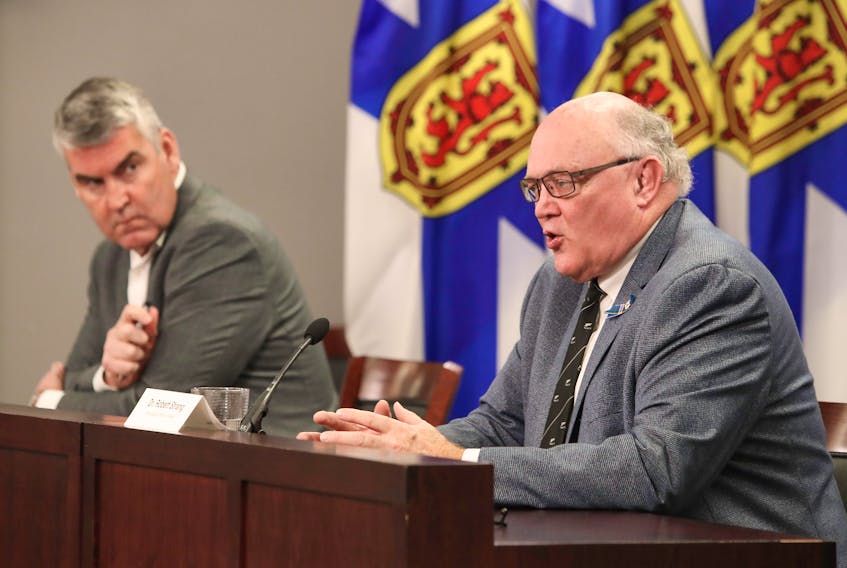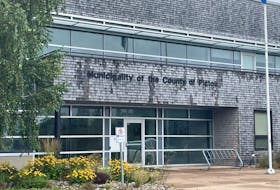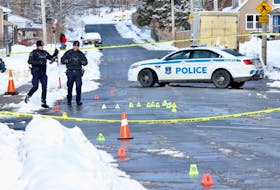With community COVID-19 spread on the rise and another school case identified, the province closed Auburn Drive High School and Graham Creighton Junior High School for two weeks on Friday while announcing further restrictions to try to reign in the virus.
Five new cases were reported Friday pushing the number of active cases in the province to 28. The new cases included another at Auburn Drive High School bringing the total to two at the school. One case was identified at Graham Creighton Monday.
At Friday’s COVID-19 briefing, Premier Stephen McNeil said the closures were focused less on stymying the spread of the virus than quelling concerns among parents and students.
Dr. Robert Strang, the province’s chief medical officer of health, said there were about 10-12 community spread cases, up from seven he suspected at Tuesday's briefing.
Both Strang and the premier said while the schools are closed students will have a comprehensive learn from home program. Details of the program are scheduled to be released by Education Minister Zach Churchill on Monday.
New restrictions limiting group gatherings and closer surveillance of bars and restaurants apply only to the western part of Halifax Regional Municipality. Spread has been identified in Bayers Lake and Clayton Park areas and the new measures are an attempt to nip the problem in the bud.
Still, questions remain about reduced testing numbers as the province invokes new restriction measures while issuing multiple exposure warnings in recent weeks. None of the 60,000 rapid antigen tests are being used. Strang suggested that they would be considered when and if a significant spread occurs. The province is also nowhere near its stated goal of 2,500 tests per day, completing 1,384 Nova Scotia tests on Thursday.
Strang wouldn’t identify whether the new case identified at Auburn High was a student or staff member. He became visibly frustrated after one reporter pushed him for more information on how the spread occurred at the schools, saying “We don’t know for sure. … Your’re asking us for us to be definitive when we can’t be.”
Both Strang and the premier blamed the uptick in cases on an 18-34 age group. Strang said surveillance of bars and restaurants would be stepping up. Those inspection teams, including from alcohol and gaming and occupational health and safety are working on an enforcement plan.
The federal government will acquire millions of vaccines in the new year. But Strang offered little reassurance that the wider Nova Scotia population would be vaccinated any time soon.
He said there’s a possibility the province would get a very small number of vaccines as early as January but those would be earmarked for those most in need, including front-line health care workers as well as the elderly and people with underlying heath conditions.
“We have no certainty of getting a vaccine," said Strang. “We have no certainty of timing and we have no certainty of the amount.”
He said Public Health is in the process of developing a rollout plan for once vaccines arrive.
The province's announced new gathering limits will apply in all of HRM except the areas east of Porters Lake to Ecum Secum. The limits will also apply to the Enfield and Mount Uniacke areas in both HRM and Hants County. The limits do not apply in Elmsdale and communities north of there.
From Nov. 23, at 12:01 a.m., to Dec. 21, the gathering limits in those areas of HRM and Hants County will be as follows:
*five people can gather in a close social group without physical distancing, down from 10
* a household may have more than five members but they may only go outside the home in groups of five
* households can only have a maximum of five visitors at a time
* onsite gatherings at long-term care facilities can have a maximum of five people (including residents and staff), down from 10
* adult day programs for seniors who live in the community will not be allowed
* 25 people, down from 50, can gather with physical distancing for informal indoor and outdoor social events like a neighbourhood street party
* indoor events run by a recognized business or organization can have 50 per cent of the venue's capacity to a maximum of 100 people with physical distancing, down from 200
* outdoor events run by a recognized business or organization can have 150 people with physical distancing, down from 250
Bar staff in peninsular Halifax will be tested over seven days starting early next week. Staff will receive information from their employer soon on how to arrange testing.
On Tuesday, Strang confirmed community spread in the province. Since then, the Nova Scotia Health Authority issued several advisories warning people of potential exposure to COVID-19 at local businesses. Nine locations in Halifax, Bayers Lake, Bedford and Larry Uteck were identified Thursday night.
Nova Scotia Health Authority's labs completed 1,384 Nova Scotia tests on Thursday.
To date, Nova Scotia has 126,446 negative test results, 1,160 positive COVID-19 cases and 65 deaths. No one is currently hospitalized in relation to the virus.
Anyone who is currently experiencing or has experienced within the last 48 hours one of the following symptoms should visit https://covid-self-assessment.novascotia.ca for a self-assessment: new or worsening cough and fever (i.e. chills or sweats).
People should also visit the website if they are experiencing two or more of the following symptoms (new or worsening): sore throat, runny nose or nasal congestion, headache, and shortness of breath.
People can also call 811 if they can't access the website or if they wish to speak to a nurse. Anyone experiencing symptoms should self-isolate until they receive advice from public health on what to do next.









